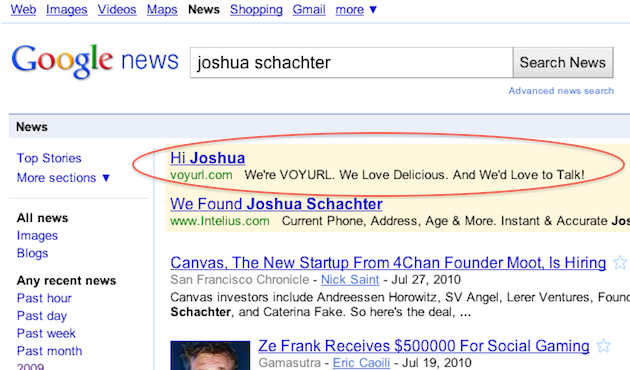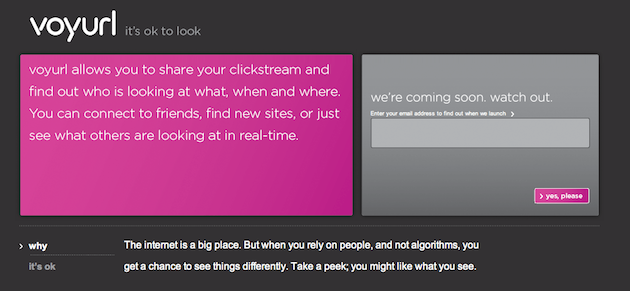
A few weeks ago, we were alerted to a new site currently in stealth mode called Voyurl. As the name implies, the idea behind it is to make it so you can see what other people are looking at on the web (and to make your clickstream seen). It sounds creepy as hell. It’s like Blippy but with more potential porn. I love it.
But when I tried to sign up for the service, they sent me a note back that it wasn’t quite ready yet and that they were cranking on the beta. Fine, that happens from time to time. I can be patient. But I’m not sure I can quietly wait any longer when the site starts running ads like this.
As freshly unemployed angel investor Joshua Schachter pointed out this evening, Voyurl has one hell of a way to get potential investors’ attention: buy Google ads targeted at them. “Well, that’s one way to get a potential investor’s attention. I’m either impressed or creeped out,” Schachter notes.
Voyurl’s ad reads: Hi Joshua. We’re VOYURL. We Love Delicious. And We’d Love to Talk!
Well, it definitely worked. He saw the ad — though it’s not clear if he wants to talk after seeing it.
I, for one, am even more intrigued now. The service is giving me some spiel about how it’s all about open data. That’s nice, but what I find really interesting is the concept of people showing off every website they’re browsing at all times — in realtime. From their landing page:
A little creeped out? That’s cool. But don’t worry, it’s ok to look. Besides, you can turn off voyurl at any time, for those, ahem, unmentionable sites. Plus, you can set your own filters. See, it’s not that scary.
Again, Blippy for web browsing.
Ads targeted at angel investors aside, they’re actually trying to raise money through Kickstarter. While would-be Facebook rival Diaspora raised some $200,000 that way, Voyurl only has about $1,300 so far. But they still have 75 days to go to reach their $10,000 goal — so help them out if this idea interests you.
Voyurl co-founder Adam Leibsohn managed to get profiled a couple years ago in the New York Times. Here’s what they wrote:
Adam Leibsohn, a 27-year-old communications strategist who makes roughly $60,000 a year and pays $1,650 a month for his own apartment in the East Village, says the trick to squeaking by in the city is to swear off impulse purchases and credit cards. He cooks for himself, pirates wireless Internet access and buys electronics from Craigslist or eBay. If he wants new clothes, he unloads old ones first at the Salvation Army, keeping the receipt for his taxes. “It’s kind of a spartan lifestyle,” he says. “I eat a lot of street meat for lunch.”
Again, I keep getting more intrigued. Is Voyurl going to be the next big thing, or a haven for online predators? I can’t wait to find out.
As a sidenote, this is the second time Schachter has found oddly targeted ads around his name. The last time, it was Yahoo (the company he quit in 2008 after selling Delicious to them) who was trying to find new employees on Google off of searches for his name. Classy.
Schachter apparently loves Googling himself. As we all do. Soon, we’ll be able to prove it on Voyurl.































Comment